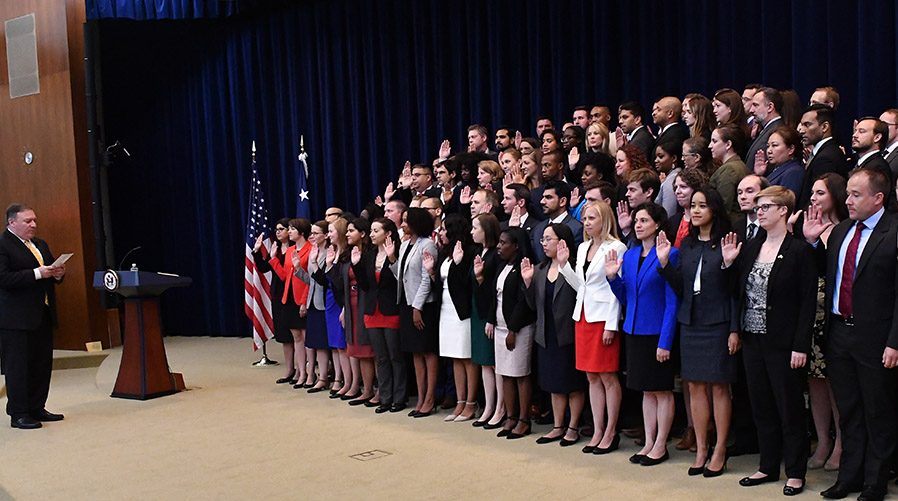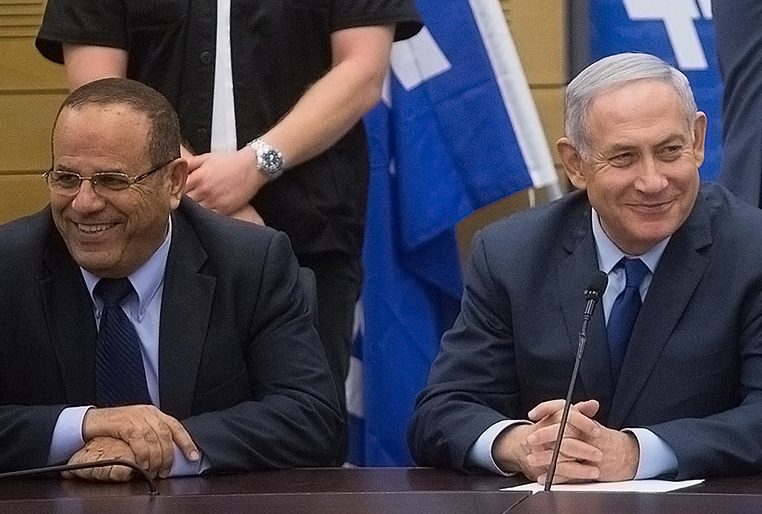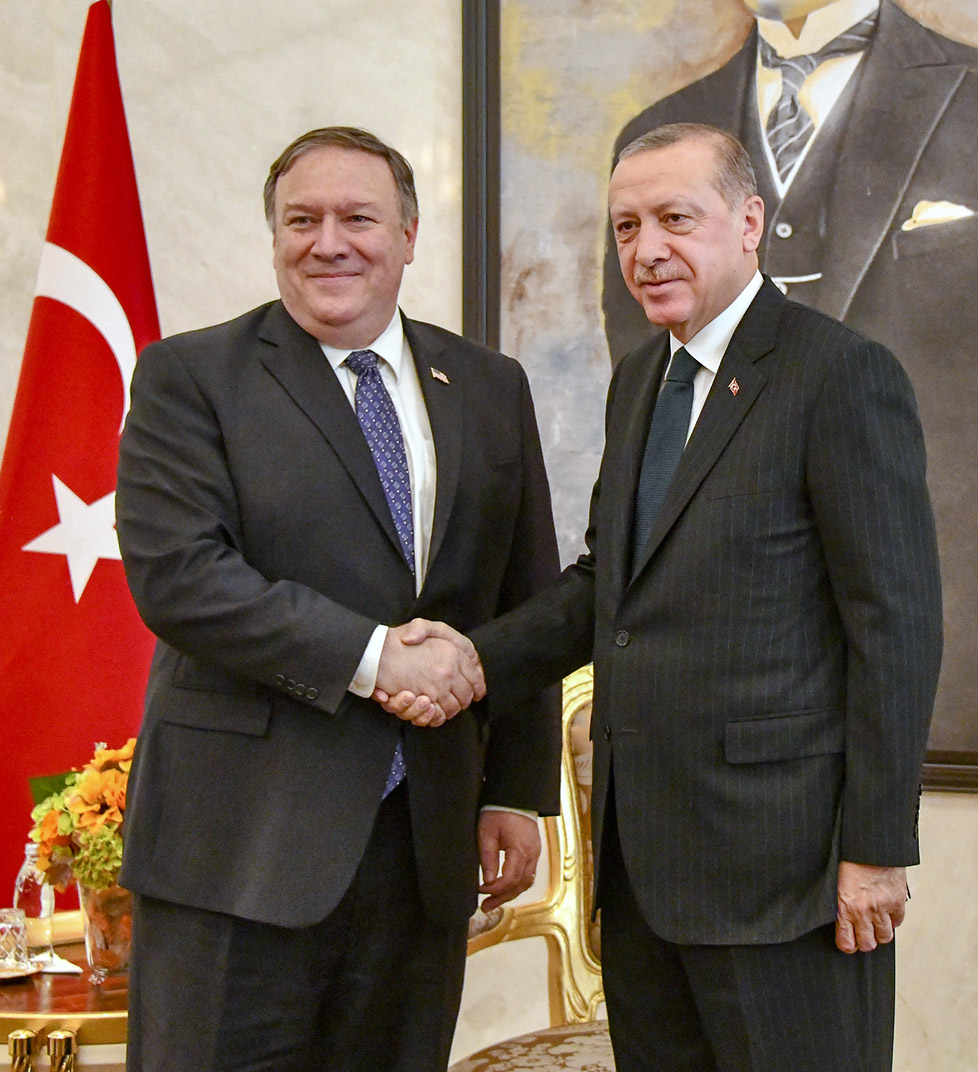
Secretary Michael R. Pompeo swears in the 194th Foreign Service Generalist Class at the Department of State, August 17, 2018. Photo by Michael Gross.
By Berkay Gülen
On January 30, 2017, one thousand United States Foreign Service officers signed a five-page memo expressing their opposition to U.S. President Donald Trump’s executive order banning refugees and immigrants from Iran, Iraq, Libya, Somalia, Sudan, Syria, and Yemen from entering the United States.
This was the most-signed dissent statement in U.S. history — the second-biggest dissent memo, criticizing Obama’s Syria policy, had only 51 signatories — using a protocol designed to allow U.S. State Department employees to express their disagreement without being subject to any penalty. In response, the White House press secretary commented that the foreign service officers could “get with the program or they can go.”
Similarly, in 2010, 72 retired ambassadors and consul-generals in Turkey issued a written statement criticizing the Turkish government’s foreign policy and highlighting the sacrifices they made during their service. Then-Turkish Prime Minister Erdoğan responded: “Your diplomacy is what put this country in this hard position. We [my administration] started the era of one-on-one, strong, honorable diplomacy.”
A disagreement between civil servants and political leaders is not new in the corridors of Washington D.C. or Ankara, and not only the practice of strongman-style leaders. For example, three American diplomats publicly criticized and resigned in protest over the second Iraq War in 2003. Today, however, more and more diplomats are disagreeing with their governments while struggling to represent the interests of their states abroad.
There has been an ongoing discussion between retired and serving diplomats about whether or not a diplomatic representative should resign if his or her criticisms are ignored in the capital. So, how do long-term foreign service members deal with a government that makes foreign policy choices they disagree with?
A history of disagreement, and current challenges
Before the era of mass communication, there were many mechanisms for diplomats to express disagreement with their governments’ decisions. During my research in Israel and Turkey last year, I talked to more than 40 Turkish and Israeli senior diplomats, and they mentioned the importance of sharing critical stances in reports written for the capital.
In the past, the confidential correspondence between diplomatic staff abroad and in the capital offered a platform to diplomats for sharing their concerns, as well as recommendations, with higher authorities in the state. On rare occasions, diplomats might also talk off-the-record to the media, or simply to their friends in the media, in order to influence both the public and the government around certain policies.
Nowadays, traditional channels like these do not function very well because of the politicization of foreign policy making — making decisions based solely on dominant political figures rather than through discussions between elected politicians and appointed bureaucrats.

Prime Minister Benjamin Netanyahu with Ayoub Kara, candidate for the position of envoy to Egypt, at a Likud party meeting, May 7, 2018. Photo by Miriam Alster.
For instance, American diplomats have criticized the rapid increase in the number of political appointees in assistant secretary and higher-ranking positions at the State Department, which has increased from 37 percent in 1975 to 51 percent in 2014. Sometimes the concerns are specific: Recently, the Israeli Ministry of Foreign Affairs and retired Israeli envoys publicly urged Israeli Prime Minister Benjamin Netanyahu not to appoint a political figure, a Likud lawmaker, as Israel’s ambassador to Egypt, in lieu of a highly qualified professional diplomat who had previously served in Egypt and headed the Foreign Ministry’s Egypt division.
American diplomats also mention a current climate of distrust between the White House and the State Department, starting before the Trump administration. American presidents in specific, and prime ministers in general, as in Israel, do not view diplomatic personnel as competent and capable of responding to international crises in a timely way.
One of the main reasons for this perception, according to Nicholas Kralev, who interviewed more than 600 American diplomats for his recent book, is that the State Department and especially the Foreign Service are ill-prepared to deal with modern international crises. In a world where political circumstances change rapidly, the professional training of diplomats does not prepare them to deal with quickly developing global challenges, and politicians are reluctant to invest in long-term on-the-job training, which develops the professional abilities of diplomatic personnel.
What professional diplomats offer
Why should states invest in diplomatic training when the world is changing so rapidly? Amanda Sloat, Robert Bosch Senior Fellow at the Brookings Institution, who visited the UW campus last winter, emphasizes the value of diplomatic stances in resolving strongmen’s fights in international politics.

U.S. Secretary of State Michael Pompeo meets with Turkish President Recep Tayyip Erdoğan in Ankara, Turkey, October 17, 2018. Photo by Ron Przysucha.
In a recent dispute between the United States and Turkey over the imprisonment of an American pastor in Turkey, both Turkish and American presidents took sharp stances that worsened the crisis between the two NATO allies. In circumstances like these, Sloat argues, diplomats have the ability to negotiate in a dispassionate way, and could find some measures to repair the bilateral relationship, where leaders disagree on various issues from the Syrian Civil War to the Israel-Palestine conflict.
As government employees in various countries struggle to cope with the ideology of the leaders or political parties in power, the profession of diplomacy faces the same challenges. Unlike other advisers, who offer policy options through reports, diplomatic staff observe political crises on the ground and analyze the political circumstances around a potential decision based on their experience as well as observations in the country they serve.
Due to the politicization of foreign policy and the popular appeal of criticizing bureaucratic systems as inefficient, slow, and ineffective, the old methods of communication between civil servants and elected representatives are not working anymore. Diplomats are becoming more and more invisible in international crises, despite their potential to contribute to solutions. Moreover, this tension between the two pillars of the state — elected representatives and appointed government workers — does nothing to help solve serious international problems, from mass migration to climate change.







Leave A Comment